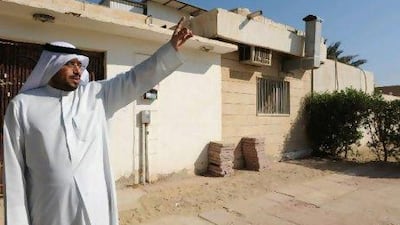AHMADI, KUWAIT // Built for British oil workers in the 1940s, the quaint city of Ahmadi, with its gardens, churches and tree-lined streets, was often considered one of Kuwait's most desirable places to live.
The popularity of the city, the headquarters of the huge state-owned Kuwait Oil Company (KOC), dimmed on November 11, when an explosion ripped through the normally tranquil streets.
In the aftermath of the blast, which has been blamed on underground gas, scores of families have been evacuated and some residents are calling for permanent relocation elsewhere.
"We want houses in different areas - Kuwait Oil Company can take this place," said Adnan al Shamari, a board member of the local co-operative society. "The gas is coming up from the ground. This has been going on for a long time."
Brig Gen Jassem al Mansouri, the chief of Kuwait Fire Department and head of the team that has been formed to deal with the crisis, said on Tuesday there were "pockets of natural gas scattered across" the city.
"Up to this moment, we've already evacuated 91 from a total of 196 houses," he said.
No one was injured in the blast that bent doors and window frames of an unoccupied villa, but others have been hurt and killed in other gas-related incidents nearby. In February, a young girl was injured at an explosion in her home, and last year at least three men were killed when a Shiite prayer hall was reduced to rubble.
"The problem began about two years ago when we started to smell gas at night," said one resident, Abdullah Mohammed, a retired Arabic teacher. "We spoke with KOC and they said it would be fixed, but about two or three months ago, the smell got worse. Now it stinks."
"We're nervous because this situation is very dangerous. Look at the streets, they're all damaged," Mr Mohammed said, as teams of KOC engineers wandered through the villas testing the air and soil for fumes.
On Sunday, the government approved the creation of a centre to deal with future crises and formed a commission to determine the cause of the leaks. The evacuated residents have been provided with flats and the promise of 500 Kuwaiti dinars (Dh6,540) for each family every month. Once the money was distributed, they would have to pay for accommodation, Brig Gen al Mansouri said.
"This amount of money may not be fit for all the families," he acknowledged.
The brigadier general said natural gas built up in underground pockets when a pipe network constructed in 1950 to deliver fuel to houses leaked. He said the old pipes were dug up in 2004. The state oil company started operating a new network in 2006, and it was purged of gas when the problems intensified three months ago, he said. The residents now use gas cylinders.
Engineers were searching for areas with high gas readings and would take steps to release it into the air, he said. The natural gas "gets through to houses by the electrical cable panels, telephone panels and sewage".
Some local press reports were blaming the leaks on a botched attempt to replace the pipes. Khalid al Hajri, the chairman and general co-ordinator of the Green Line environmental group, said the government did not yet know if the gas was coming from the old pipe network or a natural source.
"We think there are natural reserves of gas under the city - caves that might collapse," Mr al Hajri said. "Now we are seeing the truth, the government cannot solve the problems that we are facing."
The oil company did not know the real reason for the leaks, either, said Ahmed al Otaibi, who is retired and lives next door to the house that exploded and sparked the crisis.
"It could be down to a mistake from the oil company, bad maintenance of the pipes or the geology of the Burgan field. I think they're hiding some facts," he said.
"The residents are getting together to form a committee to decide what to do next.
"The voice of the area is one voice," he said.

